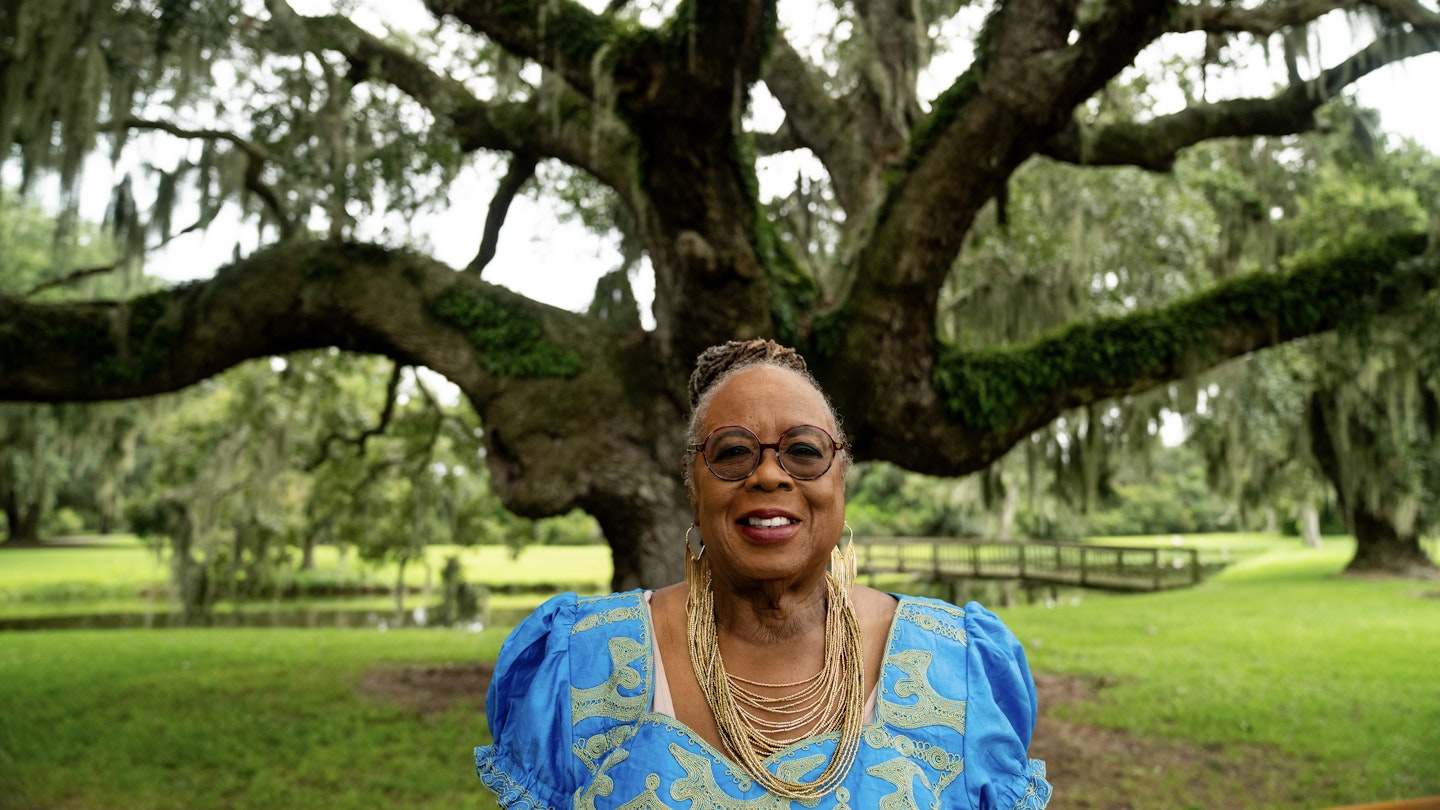I remember my amazement when I first learned that the famous song “Kumbaya” – a spiritual known by every kid who’s ever gone to summer camp – is, in fact, a Gullah Geechee tune. To the Gullah Geechee community, it means “come by here.”
This phenomenon illustrates how Gullah culture has thrived for hundreds of years in the USA. Its influence on Southern and broader American culture has always been present, even if its roots haven’t been fully acknowledged. Whether you order a plate of shrimp and grits or hoppin’ John, you’ll be tasting Gullah culinary traditions. Moreover, if you observe high school and college groups performing step routines, you may notice similarities to hamboning, a traditional Gullah rhythmic movement.
What Defines the Gullah Geechee People?
The Gullah Geechee people are primarily African Americans descended from those enslaved in the U.S. However, what sets them apart is their geographical roots. Their ancestors were enslaved on and near the barrier islands stretching from Wilmington, North Carolina, down to Jacksonville, Florida. These communities were relatively isolated compared to other Black American communities, allowing the Gullah Geechee to retain more of their African heritage. They speak a creole language known as Gullah (or occasionally Geechee), which blends English words with various African languages. As evidenced by terms like “Kumbaya,” many Americans recognize at least a few Gullah words.
Currently, most Gullah and Geechee communities reside along the coasts of South Carolina and Georgia, although their descendants live across the country. Following the barrier islands along the seaboard will reveal the richness of Gullah Geechee culture.
Best Places to Experience Gullah Geechee Culture
From north to south, here are some of the top places to immerse yourself in Gullah culture:
1. Reaves Chapel, Navassa, North Carolina
Reaves Chapel AME Church is one of the oldest structures built for African Americans in North Carolina. There are ongoing efforts to preserve this historical site, making it a future destination for Gullah Geechee tours in coastal North Carolina. Although visitors cannot enter the church, the community of Reaves, historically Gullah Geechee, is open to exploration.
2. Poplar Grove Plantation, Wilmington, North Carolina
This former sweet potato and peanut plantation is now listed on the National Register of Historic Places. It serves as a part of the National Park Service’s Gullah Geechee Cultural Heritage Corridor, featuring exhibits that highlight the experiences of Black Americans from the Civil War through the Civil Rights movement, as well as the cultural importance of peanuts in Gullah culture.
3. Gullah Museum, Georgetown, South Carolina
Founded by Gullah community members, this engaging one-room museum tells the complete story of Gullah history and culture. Here, you can learn about Gullah foodways, music, language, and religious practices through a variety of artifacts.
4. International African American Museum, Charleston, South Carolina
Open since 2023, the International African American Museum provides an overarching narrative of African-descended people in the U.S., including a section dedicated to the Gullah Geechee. Visitors can learn about the unique flat-bottomed boats used by Gullah Geechee people to navigate the Lowcountry’s marshes and spiritual practices like the ring shout.
5. Gullah Tours, Charleston, South Carolina
Tour guide Alphonso Brown, who grew up in Rantowles, South Carolina, leads groups around significant Gullah culture and Black history sites in Charleston.
6. Hannibal’s Kitchen, Charleston, South Carolina
This casual restaurant has been a staple for soul food and Gullah cuisine since 1985. The food comes out hot and fresh, with crab rice and okra soup as standout items on the menu.
7. Charleston City Market, Charleston, South Carolina
One of the oldest commercial spaces in the country, Charleston City Market has been operational for over 200 years. Inside, Gullah artisans sell their signature sweetgrass baskets, a craft that is uniquely tied to the coastal Gullah culture.
8. Joseph Fields Farm, Johns Island, South Carolina
This family-run farm, about 25 minutes outside of Charleston, is owned by Joseph Fields, a third-generation Gullah farmer. Visitors can purchase fresh fruits and vegetables at the farm stand or participate in pick-your-own fruit events during strawberry season.
9. McLeod Plantation, James Island, South Carolina
Now a significant historical park, this former plantation focuses on the experiences of the Gullah Geechee people. Guided interpretive tours provide insight into Gullah culture and the labor involved in cotton cultivation and processing.
10. The Gullah Grub, St Helena’s Island, South Carolina
Chef Bill Green has been serving seasonal, farm-to-table Gullah cuisine for over 15 years with a focus on rice dishes and seafood gumbo.
11. Underground Tours of Savannah, Savannah, Georgia
Sistah Pat, a Gullah Geechee woman, leads informative tours through Savannah, sharing stories about the city’s Black American history and the lives of enslaved individuals.
12. Beach Institute, Savannah, Georgia
This institute showcases African American perspectives through various art forms, including quilt making and folk art, further preserving the history of Black Americans in Savannah and the Sea Islands.
13. Pin Point Heritage Museum, Montgomery, Georgia
Located in a former oyster factory, this museum honors the Gullah Geechee community from Pin Point, showcasing their relationship with the coastal waters.
14. First African Baptist Church, Cumberland Island, Georgia
This historic church, built in the late 19th century, is listed on the National Register of Historic Places. The site remains accessible only via a long hike or biking, providing a uniquely preserved experience.
15. Kingsley Plantation, North Jacksonville, Florida
This former sea-island cotton plantation is now part of the Timucan Ecological and Historic Park and Preserve, where you can explore cabins where enslaved individuals once lived and learn about significant figures in Gullah history.
16. Foxy Lady Café, Jacksonville, Florida
Founded by Chef Shandon Benjamin-Fox, this restaurant features innovative interpretations of Southern comfort food, drawing from family recipes.
In conclusion, the Gullah Geechee culture is a vital aspect of American history, particularly in the Southeastern United States. Therefore, exploring these sites will provide a deeper understanding and appreciation for this unique heritage.





